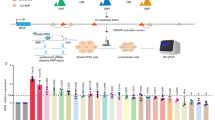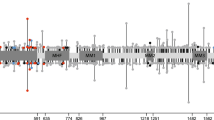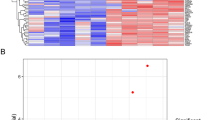Abstract
Co-stimulatory CD28 and transcription factor NFKB1 genes are considered as a crucial player in the determination of inflammatory responses; genetic variability in these may modulate the risk for idiopathic recurrent miscarriages (IRM). We investigated the association of functional variants of CD28 (rs3116496 T/C) and NFKB1 (rs28362491 ins/del and rs696 A/G) with IRM cases. We recruited 200 IRM women with a history of at least three consecutive pregnancy losses before 20th week of pregnancy and 300 fertile control women. Determination of CD28 (rs3116496 T/C) and NFKB1 (rs28362491 ins/del and rs696 A/G) gene variants were based on the polymerase chain reaction pursued by restriction fragment length polymorphism analysis and validated with Sanger sequencing. Single marker analysis and multifactor dimensionality reduction (MDR) model used to predict the IRM risk. We observed nearly three- to twofold increased risk in single marker analysis for minor homozygous genotypes of rs3116496 T/C, rs28362491 ins/del and rs696 A/G tag-SNPs in IRM cases, suggesting the risk association. In MDR analysis, we observed 10.5-fold augmented risk among IRM women in three-SNP model (rs3116496 T/C, rs28362491 ins/del and rs696 A/G). The eQTL mapping analyses was performed to strengthen the results of our study. The eQTL mapping analysis revealed that the variations in CD28 and NFKB1 gene content might affect the abundance of transcripts of CD28 and Family with sequence similarity 177 member A1 (FAM177A1) genes, respectively. These results suggest that CD28 and NFKB1 gene variants may be associated with increased risks to IRM.
Similar content being viewed by others
Log in or create a free account to read this content
Gain free access to this article, as well as selected content from this journal and more on nature.com
or
References
Christiansen, O. B., Steffensen, R., Nielsen, H. S. & Varming, K. Multifactorial etiology of recurrent miscarriage and its scientific and clinical implications. Gynecol. Obstetr. Investig. 66, 257–267 (2008).
Zenclussen, A. C., Gerlof, K., Zenclussen, M. L., Sollwedel, A., Bertoja, A. Z., Ritter, T. et al. Abnormal T-cell reactivity against paternal antigens in spontaneous abortion: adoptive transfer of pregnancy-induced CD4+CD25+ T regulatory cells prevents fetal rejection in a murine abortion model. Am. J. Pathol. 166, 811–822 (2005).
Mold, J. E., Michaelsson, J., Burt, T. D., Muench, M. O., Beckerman, K. P., Busch, M. P. et al. Maternal alloantigens promote the development of tolerogenic fetal regulatory T cells in utero. Science 322, 1562–1565 (2008).
Saito, S., Nakashima, A., Shima, T. & Ito, M. Th1/Th2/Th17 and regulatory T-cell paradigm in pregnancy. Am. J. Reprod. Immunol. 63, 601–610 (2010).
Lee, S. K., Kim, J. Y., Lee, M., Gilman-Sachs, A. & Kwak-Kim, J. Th17 and regulatory T cells in women with recurrent pregnancy loss. Am. J. Reprod. Immunol. 67, 311–318 (2012).
Mei, S., Tan, J., Chen, H., Chen, Y. & Zhang, J. Changes of CD4+CD25 high regulatory T cells and FOXP3 expression in unexplained recurrent spontaneous abortion patients. Fertil. Steril. 94, 2244–2247 (2010).
Jiang, G. J., Qiu, L. H. & Lin, Q. D. Regulative effects of regulatory T cells on dendritic cells in peripheral blood and deciduas from unexplained recurrent spontaneous abortion patients. Zhonghua fu chan ke za zhi 44, 257–259 (2009).
Vang, K. B., Yang, J., Pagan, A. J., Li, L. X., Wang, J., Green, J. M. et al. Cutting edge: CD28 and c-Rel-dependent pathways initiate regulatory T cell development. J. Immunol. 184, 4074–4077 (2010).
Rudd, C. E., Taylor, A. & Schneider, H. CD28 and CTLA-4 coreceptor expression and signal transduction. Immunol. Rev. 229, 12–26 (2009).
Collins, M., Ling, V. & Carreno, B. M. The B7 family of immune-regulatory ligands. Genome Biol. 6, 223 (2005).
Chen, L. Co-inhibitory molecules of the B7-CD28 family in the control of T-cell immunity. Nat. Rev. Immunol. 4, 336–347 (2004).
Hutloff, A., Dittrich, A. M., Beier, K. C., Eljaschewitsch, B., Kraft, R., Anagnostopoulos, I. et al. ICOS is an inducible T-cell co-stimulator structurally and functionally related to CD28. Nature 397, 263–266 (1999).
Yoshinaga, S. K., Whoriskey, J. S., Khare, S. D., Sarmiento, U., Guo, J., Horan, T. et al. T-cell co-stimulation through B7RP-1 and ICOS. Nature 402, 827–832 (1999).
Nabel, G. J. & Verma, I. M. Proposed NF-kappa B/I kappa B family nomenclature. Genes Dev. 7, 2063 (1993).
Abdallah, A., Sato, H., Grutters, J. C., Veeraraghavan, S., Lympany, P. A., Ruven, H. J. et al. Inhibitor kappa B-alpha (IkappaB-alpha) promoter polymorphisms in UK and Dutch sarcoidosis. Genes Immun. 4, 450–454 (2003).
Wang, X., Ma, Z., Hong, Y., Lu, P. & Lin, Q. Expression of CD28 and cytotoxic T lymphocyte antigen 4 at the maternal-fetal interface in women with unexplained pregnancy loss. Int. J. Gynaecol. Obstetr. 93, 123–129 (2006).
Ross, J. W., Ashworth, M. D., Mathew, D., Reagan, P., Ritchey, J. W., Hayashi, K. et al. Activation of the transcription factor, nuclear factor kappa-B, during the estrous cycle and early pregnancy in the pig. Reprod. Biol. Endocrinol. 8, 39 (2010).
Vaughan, J. E. & Walsh, S. W. Activation of NF-kappaB in placentas of women with preeclampsia. Hypertens. Pregnancy 31, 243–251 (2012).
Gunesacar, R., Erken, E., Bozkurt, B., Ozer, H. T., Dinkci, S., Erken, E. G. et al. Analysis of CD28 and CTLA-4 gene polymorphisms in Turkish patients with Behcet's disease. Int. J. Immunogenet. 34, 45–49 (2007).
Ledezma-Lozano, I. Y., Padilla-Martinez, J. J., Leyva-Torres, S. D., Parra-Rojas, I., Ramirez-Duenas, M. G., Pereira-Suarez, A. L. et al. Association of CD28 IVS3 +17 T/C polymorphism with soluble CD28 in rheumatoid arthritis. Dis. Markers 30, 25–29 (2011).
Orozco, G., Sanchez, E., Collado, MD., Lopez-Nevot, M. A., Paco, L., Garcia, A. et al. Analysis of the functional NFKB1 promoter polymorphism in rheumatoid arthritis and systemic lupus erythematosus. Tissue Antigens 65, 183–186 (2005).
Szamosi, T., Lakatos, P. L., Hungarian IBD Study Group Szilvasi, A., Lakatos, L., Kovacs, A. et al. The 3'UTR NFKBIA variant is associated with extensive colitis in Hungarian IBD patients. Dig. Dis. Sci. 54, 351–359 (2009).
Wu, Z., You, Z., Zhang, C., Li, Z., Su, X., Zhang, X. et al. Association between functional polymorphisms of Foxp3 gene and the occurrence of unexplained recurrent spontaneous abortion in a Chinese Han population. Clin. Immunol. 2012, 896458 (2012).
Saxena, D., Misra, M. K., Parveen, F., Phadke, S. R. & Agrawal, S. The transcription factor Forkhead Box P3 gene variants affect idiopathic recurrent pregnancy loss. Placenta 36, 226–231 (2015).
Siddesh, A., Parveen, F., Misra, M. K., Phadke, S. R. & Agrawal, S. Platelet-specific collagen receptor glycoprotein VI gene variants affect recurrent pregnancy loss. Fertil. Steril. 102, 1078–1084 e1073 (2014).
Iversen, A. C., Nguyen, O. T., Tommerdal, L. F., Eide, I. P., Landsem, V. M., Acar, N. et al. The HLA-G 14 bp gene polymorphism and decidual HLA-G 14 bp gene expression in pre-eclamptic and normal pregnancies. J. Reprod. Immunol. 78, 158–165 (2008).
Lin, A., Yan, W. H., Dai, M. Z., Chen, X. J., Li, B. L., Chen, B. G. et al. Maternal human leukocyte antigen-G polymorphism is not associated with pre-eclampsia in a Chinese Han population. Tissue Antigens 68, 311–316 (2006).
Tripathi, M., Chauhan, U. K., Tripathi, P. & Agrawal, S. Role of Alu element in detecting population diversity. Int. J. Human Genet. 8, 61–74 (2008).
de Bakker, P. I., Yelensky, R., Pe'er, I., Gabriel, S. B., Daly, M. J. & Altshuler, D. Efficiency and power in genetic association studies. Nat. Genet. 37, 1217–1223 (2005).
Borm, M. E., van Bodegraven, A. A., Mulder, C. J., Kraal, G. & Bouma, G. A NFKB1 promoter polymorphism is involved in susceptibility to ulcerative colitis. Int. J. Immunogenet. 32, 401–405 (2005).
Song, S., Chen, D., Lu, J., Liao, J., Luo, Y., Yang, Z. et al. NFkappaB1 and NFkappaBIA polymorphisms are associated with increased risk for sporadic colorectal cancer in a southern Chinese population. PLoS ONE 6, e21726 (2011).
Benjamini, Y. & Hochberg, Y. On the adaptive control of the false discovery rate in multiple testing with independent statistics. J. Educ. Behav. Stat. 25, 60–83 (2000).
Hahn, L. W., Ritchie, M. D. & Moore, J. H. Multifactor dimensionality reduction software for detecting gene–gene and gene–environment interactions. Bioinformatics 19, 376–382 (2003).
Westra, H. J., Peters, M. J., Esko, T., Yaghootkar, H., Schurmann, C., Kettunen, J. et al. Systematic identification of trans eQTLs as putative drivers of known disease associations. Nat. Genet. 45, 1238–1243 (2013).
Salomon, B., Lenschow, D. J., Rhee, L., Ashourian, N., Singh, B., Sharpe, A. et al. B7/CD28 costimulation is essential for the homeostasis of the CD4+CD25+ immunoregulatory T cells that control autoimmune diabetes. Immunity 12, 431–440 (2000).
Dennehy, K. M., Kerstan, A., Bischof, A., Park, J. H., Na, S. Y. & Hunig, T. Mitogenic signals through CD28 activate the protein kinase Ctheta-NF-kappaB pathway in primary peripheral T cells. Int. Immunol. 15, 655–663 (2003).
Zhou, B., Rao, L., Peng, Y., Wang, Y., Qie, M., Zhang, Z. et al. A functional promoter polymorphism in NFKB1 increases susceptibility to endometriosis. DNA Cell Biol. 29, 235–239 (2010).
Yu, Y., Wan, Y. & Huang, C. The biological functions of NF-kappaB1 (p50) and its potential as an anti-cancer target. Curr. Cancer Drug Targets 9, 566–571 (2009).
Karban, A. S., Okazaki, T., Panhuysen, C. I., Gallegos, T., Potter, J. J., Bailey-Wilson, J. E. et al. Functional annotation of a novel NFKB1 promoter polymorphism that increases risk for ulcerative colitis. Human Mol. Genet. 13, 35–45 (2004).
Acknowledgements
We are thankful to Professor Shubha R Phadke, Department of Medical Genetics, Sanjay Gandhi Post-Graduate Institute of Medical Sciences; Raebareli Road, Lucknow 226014 for the recruitment of clinically characterized idiopathic recurrent miscarriages cases. This study funded in parts through Bioinformatics Infrastructure Facility (BIF) research grant from Department of Biotechnology, Ministry of Science and Technology (DBT) and Indian Council of Medical Research, Government of India, New Delhi, India [63/8/2010-BMS].
Author information
Authors and Affiliations
Corresponding authors
Ethics declarations
Competing interests
The authors declare no conflict of interest.
Additional information
Supplementary Information accompanies the paper on Journal of Human Genetics website
Rights and permissions
About this article
Cite this article
Misra, M., Singh, B., Mishra, A. et al. Co-stimulatory CD28 and transcription factor NFKB1 gene variants affect idiopathic recurrent miscarriages. J Hum Genet 61, 1035–1041 (2016). https://doi.org/10.1038/jhg.2016.100
Received:
Revised:
Accepted:
Published:
Issue date:
DOI: https://doi.org/10.1038/jhg.2016.100
This article is cited by
-
EBF1 Gene mRNA Levels in Maternal Blood and Spontaneous Preterm Birth
Reproductive Sciences (2020)



